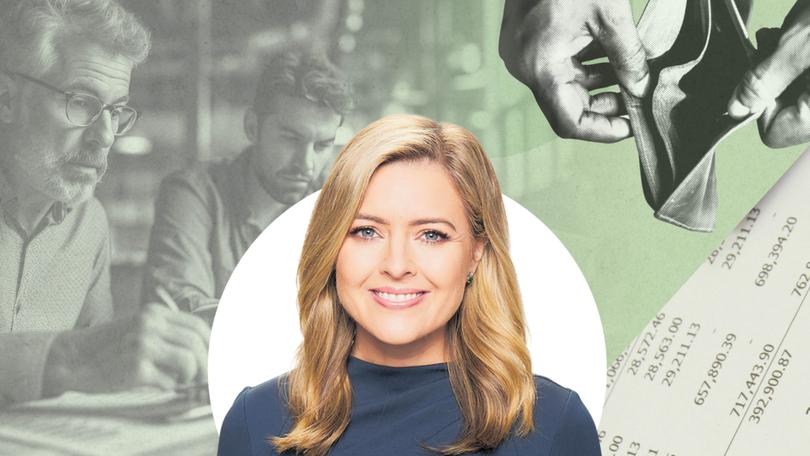GEMMA ACTON: Australians are in a happiness crisis. Is financial literacy the answer?
Australians are in a happiness crisis. Maybe implementing compulsory financial literacy programs could help pull us out.

Bad news, folks. We are in a happiness crisis.
I mean “we” in the widely inclusive royal sense. That sobering pronouncement comes to us from Arthur C. Brooks, a subject matter expert and teacher of a Harvard Business School course entitled Happiness.
Mr Brooks was referring specifically to the US, but the phenomena driving the descent in our contentment since 1990 are present in Australia, too.
Sign up to The Nightly's newsletters.
Get the first look at the digital newspaper, curated daily stories and breaking headlines delivered to your inbox.
By continuing you agree to our Terms and Privacy Policy.Chatting with podcaster Professor Scott Galloway last week, Mr Brooks pointed out that it was around 2008 that our happiness took a nosedive. Given this is a financial column, you’re probably expecting me to now tell you that it was all thanks to the financial crisis. In fact, it wasn’t.
The culprit was social media and the inciting incident was when it became available on our devices. It turns out that being able to reach into your pocket for a constant reminder of how successful your friends’ social and professional lives seem doesn’t make us feel all that great. Who knew?
Money might not make us happy, but how about the boost many people could get if they felt more confident with their finances? If we’re looking for ways to pull ourselves out of the happiness slump, implementing compulsory financial literacy programs could be a start.
Take the Danes. According to the most recent World Happiness Report, Denmark is the second-happiest nation on earth. The Nordic country also has a staggeringly high financial literacy rate of 71 per cent, compared to the global average of 33 per cent.
Here in Australia, male financial literacy is at 63 per cent, with females significantly behind at 48 per cent, according to the most recent HILDA study from 2020, courtesy of the Melbourne Institute. What’s more, it has slid backwards since 2016.
While we still rank very highly among financially literate countries globally, that’s no reason not to strive for better, particularly among women.
The Danes have had a nationwide financial literacy program in place for teens since 2015. It goes beyond the basics of budgeting, saving and compound interest to teach students about practical matters like their rights as individuals under consumer law.
Two years ago, the Ecstra Foundation launched a free program entitled Talk Money to teach schoolchildren in Years 5 to 10 about money in real-life situations in Australia. It’s available to any school at no cost. While a great start, the program, or something similar, should be compulsory.
It’s always struck me as extraordinary that in 13 years of schooling five days a week, the vast majority of students emerge without a solid grip on concepts such as compound interest, how to use a credit card, the trade-offs between buying and renting a house, how to make the most of your super, share market investing and how income tax works.
I came out of school able to do all sorts of things, from writing poems in French to calculating slopes and sides of triangles to describing in minute detail the functioning of multiple bodily organs, but I could not speak with confidence on any of those topics listed above.
It was not the fault of any particular school as I attended four excellent schools over the years and didn’t do a single lesson in practical life finance at any of them.
I had the pleasure of attending an alumni evening last week at the school where I finished Year 12, and I understand that financial literacy is now taught in primary school. This is terrific to hear. The headmistress said the lessons now start young, with games on budgeting from an early age. This makes perfect sense. I play “shops” at home with my two-year-old daughter, and she is already comfortable with the idea of selling one thing to buy something else — or “saving” the pretend money by storing it away for the next time we play.
I’m sure my old school is doing a great job of boosting financial literacy amongst its students, but it’s a tremendous missed opportunity that such an education is not mandatory and standardised across all Australian schools.
As it currently stands, the Government’s focus on financial literacy screeches to a virtual halt after Year 10 and is too vague to ensure that all students have a fighting chance to enjoy comparable levels of financial education in the years leading up to then.
There are few worse feelings than feeling out of your depth in managing your finances — and no surer way to run into financial dire straits than a lack of understanding. Financial problems are at the root of many relationship breakdowns and, tragically, suicides.
A devastating one in seven women in Australia are victims of financial abuse, living their lives without choice and in fear.
With decently high financial literacy rates already, we have a solid base upon which to build a society where the average person is confident and knowledgeable about financial basics and their own household budgets.
We must seize the opportunity to capitalise on a strong starting point. Who knows, we might even make ourselves happier along the way.
Gemma Acton is the Seven Network’s finance editor.
Originally published as Gemma Acton: Bad news, folks, we are in a happiness crisis

